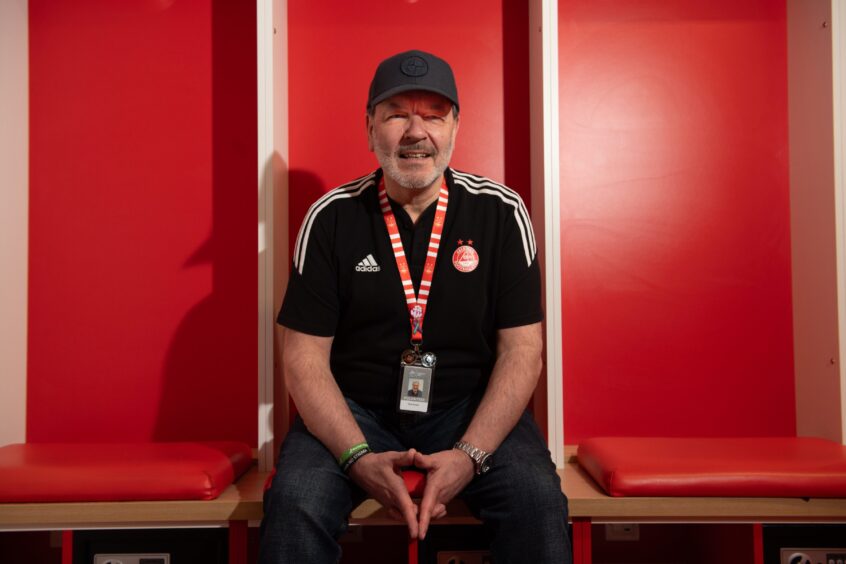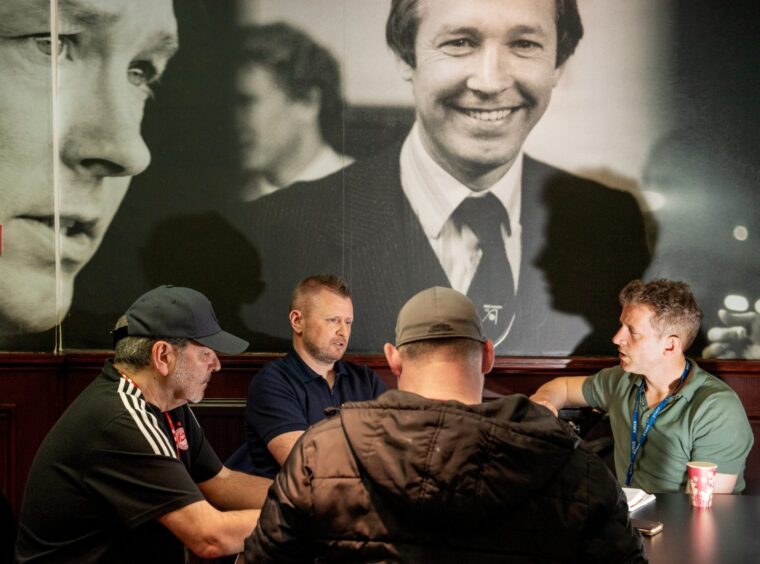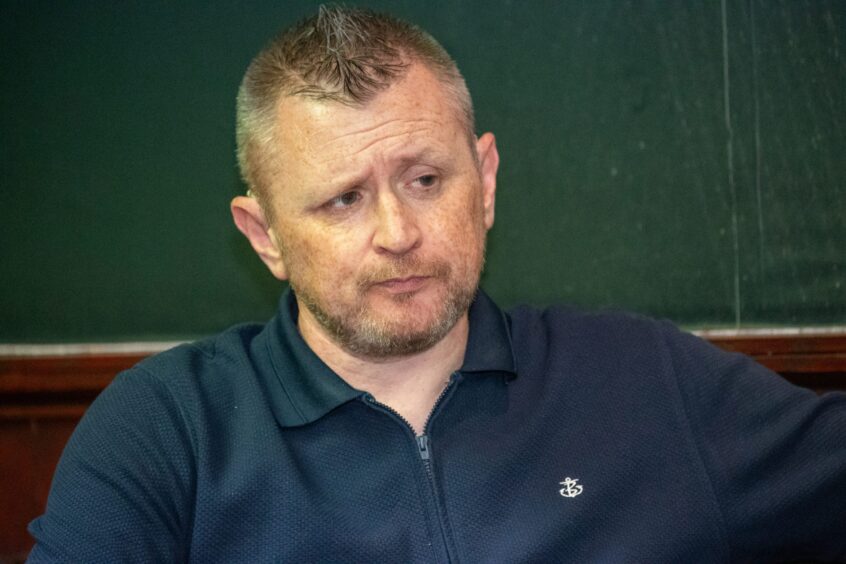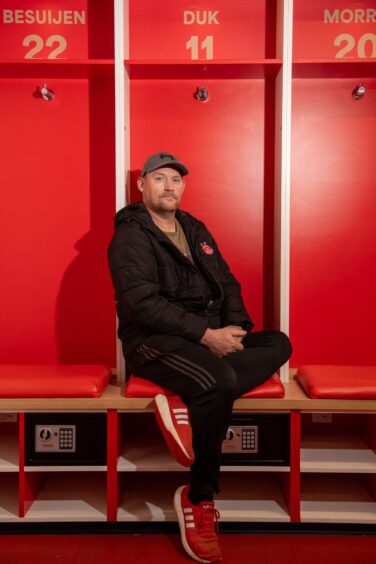World
Meet the Aberdeen men learning to live in ‘the stress capital of Scotland’

Mark Russell’s jokes are no laughing matter. But he’s ok with that.
The 63-year-old volunteer counsellor for Aberdeen FC’s men’s mental health group sessions is having his picture taken in the changing rooms at Pittodrie stadium.
All the time, he keeps up a near constant stream of terrible quips.
They come thick and fast – dad puns, pirate puns and a few jokes that can’t be repeated in a newspaper.
Is this how he conducts his sessions?
Mark smiles. “The bad jokes are all part of it,” he explains.
They might get a groan rather than a laugh but the point is that they get a reaction. From there, it’s a short step to talking.
“And ultimately,” he says, “what we are trying to do is get people to talk.”
How Aberdeen FC’s The Changing Room project helps local men
The initiative Mark helps lead is called The Changing Room. It launched last year through the Aberdeen FC Community Trust and is a 12-week programme open to men aged 30 to 64, a demographic that often lacks support networks.
Already, nine groups — Mark calls them cohorts — have been through it.
The sessions, held every Tuesday at Pittodrie, are a mix of chat and therapy using football as a jumping off point.
For example, the men might be asked to create their dream team, or talk about their favourite position. This can then lead to discussions about a first 11 made up of your go-to-support groups, whether that’s football, music or your dog.
The stigmas that stop men talking
Mark has been involved since cohort one. He quickly saw the benefits The Changing Room could bring to Aberdeen, which he says is especially tough on middle-aged men.
“I would say Aberdeen is the mental health stress capital of Scotland,” he says. “You look at the actual statistics for Aberdeen for employment and unemployment. It’s not the same city it used to be in terms of prosperity and opportunities.”
Mark know this better than most — in 2008 he attempted to take his own life after a relationship breakdown.
As he fought his way back, he learned the value of communication — about how talking about your problems and sharing them with other people can make a big difference.

Now, working with The Changing Room, he tries to encourage the cohorts he works with to learn that lesson themselves.
“The biggest word that crops up in mental health is stigma,” Mark says.
“Once you get the message to them that it’s okay to not be okay, and if you’re not okay then reach out and ask for help… once that penny drops, then the process begins.”
How Changing Room brings men back from ‘rock bottom
Mark is speaking in a room deep in the bowels of Pittodrie, sitting at a table under a watchful Alex Ferguson wall frieze. With him are two people who have been through the 12-week programme, Gary Catto and Michael Allan.
For them, The Changing Room has been life changing.
Gary, 48, signed up after an extended period of work stress brought on by losing his job as a handyman during Covid and becoming self-employed.
The Aberdonian who grew up in Mastrick remembers opening up in week three of the programme when he started bantering with Mark and, in vain, tried to outjoke him.
“There’s no point because he’ll beat you pun for pun,” Gary sighs. “He’s the Wikipedia of jokes.”
For Michael, The Changing Room has had an even more profound effect.
The 45-year-old from Stonehaven was at “rock bottom” when he first entered the programme because of relationship and work issues.
But after his first Tuesday night session, his fiancee immediately saw the change in him.
“After week one of Changing Room she said, you’re going back.”
Michael says the programme has made him more resilient, especially the add-on course Extra Time created to ensure there’s not a sudden stop for participants who come to rely on their Tuesday night meetings.
He admits that resilience comes with qualifiers. Michael has attempted to take his own life three times, most recently in February.
But he puts the fact he is still here down to his progress at Changing Room. His goal now is to follow Mark and become a volunteer with the programme.
“Not only just because it’s helped me but because I continue to need that help,” he explains.
The Changing Room is not just for Aberdeen fans
Aberdeen is not the only football club with a Changing Room initiative. The project was created by SAMH (Scottish Action for Mental Health) in partnership with the SPFL Trust and Changing Room programmes are also run at Rangers, Hearts and Hibs.
But Aberdeen has embraced it wholeheartedly, and last month Scottish health secretary Neil Gray visited Pittodrie to announce the project has been awarded £100,000 for a fourth year.
Importantly, however, while the initiative puts football at its centre, it keeps the sport’s tribalism at arm’s length.
Mark emphasises it’s not just Aberdeen fans who are encouraged to take part. The programme is open to fans of all clubs, something that Michael — a Celtic season ticket holder for more than 30 years — appreciates.
“You’re not judged on what colours you wear,” he says.
Gary chips in: “It’s like with the Scotland team. When you support Scotland we’re all together regardless of where the players come from.”
The walk and talk secret weapon
As Mark reiterates, it’s all about getting people to talk. In that regard, Changing Room has a secret weapon — the walk and talk.
This element of the programme takes place in week three, when the cohort is starting to get to know each other.
They go out to the pitch at Pittodrie and — simply — go for a walk and, if they feel like it, a talk.
Considering its simplicity, the results can be staggering.
“Mark started off the conversation about football,” says Michael. “It led to me speaking about my work problem and relief problems. It’s a powerful, powerful thing.”
Indeed, the walk and talk has proved so successful that another one has been inserted into the programme during week ten, to help those men that take longer to open up.
“There was a guy in our group, I don’t think he spoke till week 10,” Michael says.
“But as soon as he started speaking the whole room went silent because we thought this was his moment.
“It was a powerful moment for us all because he had found his voice.”
If you or someone you know is struggling, the Samaritans have a free helpline which can be accessed 24/7 by calling 116 123, or you can email jo@samaritans.org
To find out if The Changing Room is running at your club, and for more information, fill out the form here or email thechangingroom@samh.org.uk
Are you struggling with your mental health? You can access support from SAMH here.











